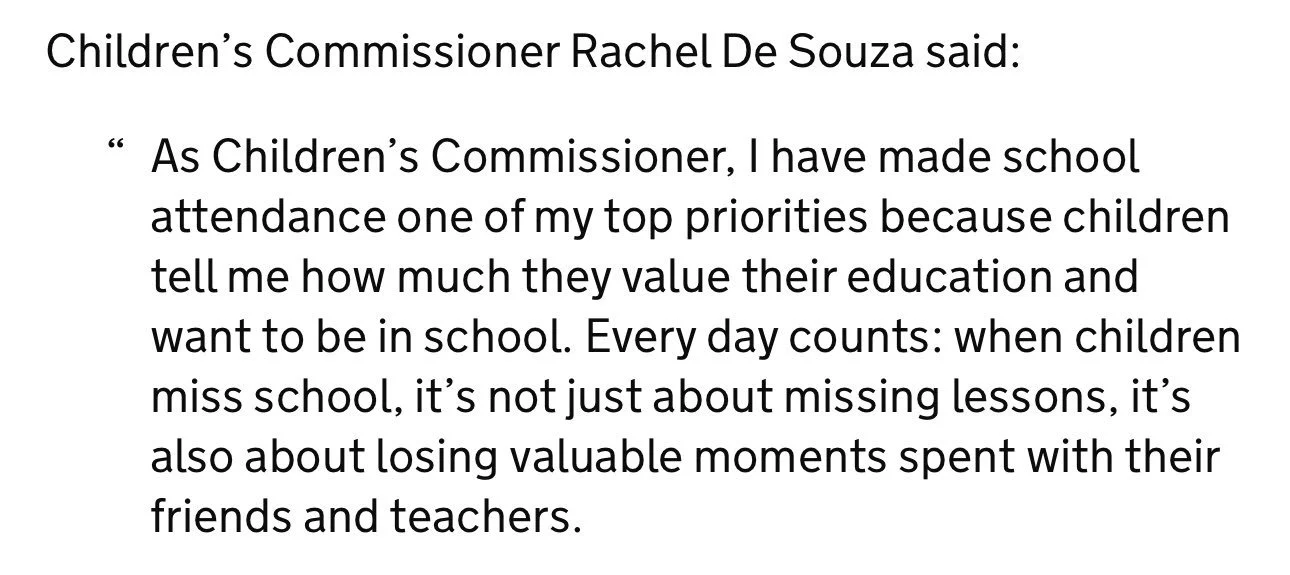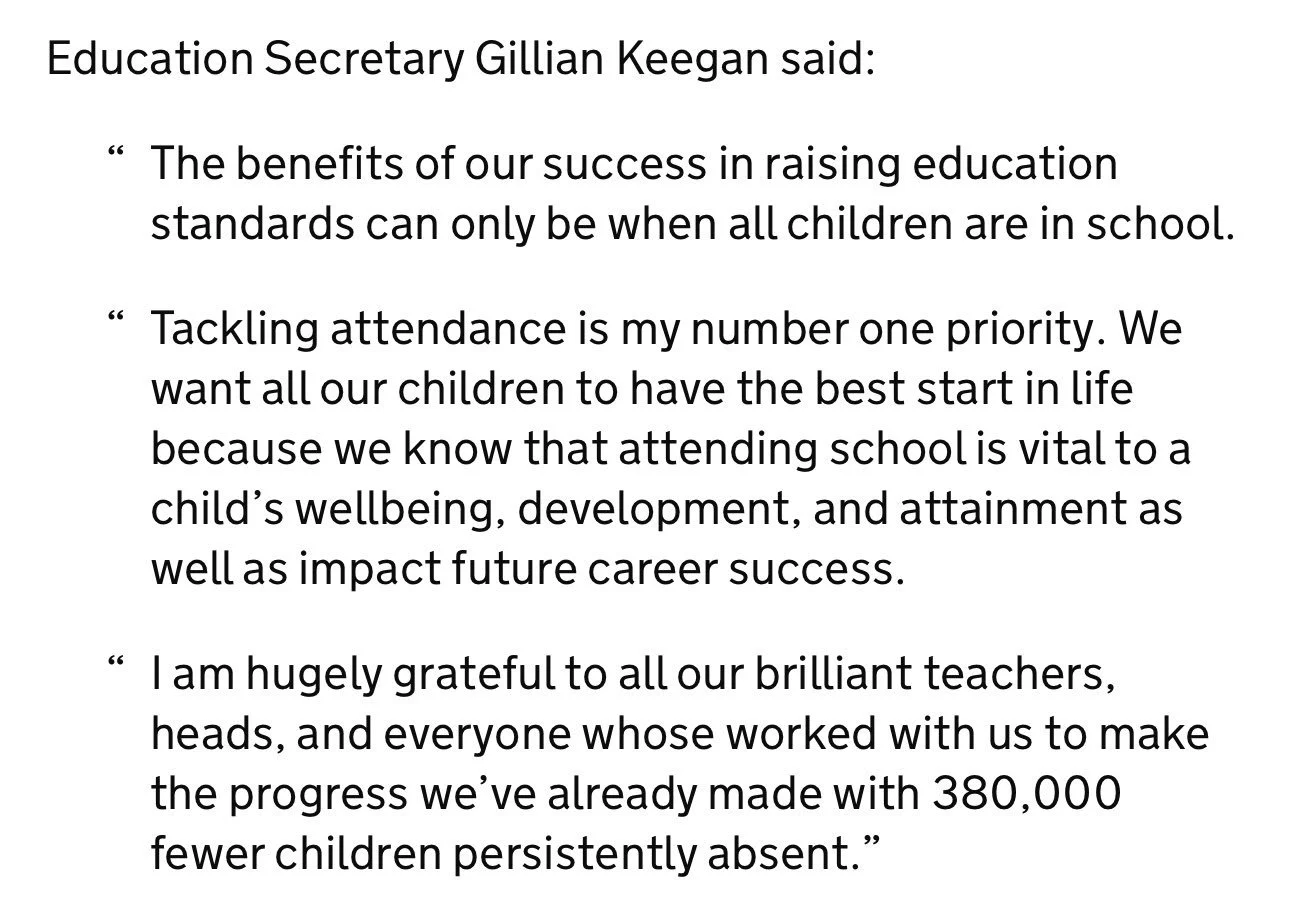I Was Not a “School Skiver”
Dear Good Morning Britain (and the government),
Following your news segment yesterday, I would like you to know that I was not a “school skiver”.
I was a child traumatised by school and exhausted from the relentless panic attacks and anxiety it triggered. A child forced back into the same environment day after day, regardless of its effects. Not a school skiver.
I was a child hurting from the bright lights, loud noises and crowds, who had no choice about having to experience this pain every day. A child who was broken from my school experiences - the bullying, the fear and the anxiety. Not a school skiver.
I was a child burnt out from having to navigate school every day, despite my brain working differently. A child who was desperate to please and terrified of getting into trouble, and spent far too much time working myself up over this. Not a school skiver.
I was a child who started school, age five, with a huge love of learning. I could read and write before I’d even started. I was inquisitive and curious. Joyful. I was a child who, by age sixteen, was self-harming just to get through the day.
You might think ‘well we are not talking about you or those like you’ when discussing ‘school skivers’. But you are. 92.1% of those with school attendance difficulties are neurodivergent. 83.4% are autistic (Connolly et al. 2023). Your words target neurodivergent kids.
The (what feels like a relentless) attack on school attendance and school refusal directly targets neurodivergent children. And it is not that they ‘won’t’ go to school and ‘refuse’, it is that they CAN’T or are struggling due to their experiences (Wadlow, 2020). They are NOT “school skivers”.
“‘While not a story of exclusivity relating solely to autism, School Distress is a story dominated by complex neurodivergence and a seemingly systemic failure to meet the needs of these CYP.”
We should be talking about adjustments not fines. We should be talking about child-led and trauma-centred approaches, not control. We should be talking about WHY so many neurodivergent kids struggle to attend school and why our system is failing them.
Instead, our government is focused on a punitive approach, targeting families already struggling with the effects of school-based trauma. Under the guise of ‘support’, families are fined and pressured to get their children back into the environment that harmed them.
The Schools Bill 2022 gave further powers to fine and prosecute parents. Despite there being NO evidence that fining or prosecuting children’s non-attendance is effective in getting them back to school. But there IS evidence showing the harm it causes (Epstein et al. 2019).
The British Psychological Society (2017) state that fines and prosecution is usually unlikely to have any effect on persistent absentees. Yet our government is so focused on this approach.
Posters like these from the Department for Education are insulting. They ignore the lived experience of so many. When I was worried about school, it was because by lunch-time I was rocking under a desk, incredibly distressed.
Again, 92.1% of those struggling to attend are neurodivergent.
And irrespective of neurodivergence, 94.3% of school attendance problems were underpinned by ‘significant emotional distress’ with ‘often harrowing accounts of this distress’.
To Rachel De Souza:
What about those being bullied day after day? Those who don’t have friends? Those whose relationships with teachers are strained because they’re only ever dysregulated and unhappy at school?
To Gillian Keegan:
How many of those no longer persistently absent are now home-schooled, because parents could find no other way of avoiding prosecution? How can you argue for ‘when all children are in school’ with the state of our SEND system?
I simply cannot fathom how Good Morning Britain and other media can describe this as a debate around ‘skiving’. I cannot believe that in 2024, school is thought to be the place children have to go to learn, and that other education options aren’t more accessible and spoken about.
‘Attending school is vital to a child’s wellbeing’ is true for some but untrue for others. School can contribute to poor well-being. My attendance was once 22%. I now work as a nurse with ND kids. My life is fulfilling. I am much happier now I don’t have to go to school.
Now, I go to work and when I forget something, I just feel frustrated at myself. I don’t worry that I am going to be shouted at.
I can get out of my chair and walk around the office or building when I am restless. I don’t have to sit still.
If I need the toilet, I can go when it is convenient. I don’t have to wait two hours until break time.
I can eat a snack if I am hungry and not have to wait until it is timetabled in.
I can wear clothes that don’t itch and don’t bring my skin out in rashes.
I am learning that my worth is not based on grades but on who I am as a person. I have never been happier, and that is sad. Because no education system should make a child feel such fear every day. And like I said, I am not the only one.
The narrative has to change. School distress and school trauma need to be taken seriously. The attendance ‘debate’ needs to centre neurodivergent children and their families. We need to look outside of the box and consider that maybe attendance isn’t everything.
Essential Resources:
Not Fine in School - parent led organisation empowering families and raising awareness of attendance barriers.
Square Peg - fighting for ‘an education system that doesn’t expect square pegs to fit into round holes’.
Steph’s Two Girls blog series ‘Not Fine in School’ - sharing real experiences.
‘Can’t Not Won’t: a story about a child who couldn’t go to school’ by Eliza Fricker, and her website.
Dr Naomi Fisher - social media, books and webinars on the education system.
Sunshine Support - school attendance difficulties and school-related trauma.
References:
Connolly, S., Constable, H. & Mullally, S. (2023). School distress and the school attendance crisis: a story dominated by neurodivergence and unmet need. https://pubmed.ncbi.nlm.nih.gov/37810599/
Epstein, R., Brown, G. & O’Flynn, S. (2019). Prosecuting parents for truancy: who pays the price? Coventry University. http://covrj.uk/prosecuting-parents/
Green. A. (2022). What can we learn from parents and caregivers of school-aged children to inform current Emotionally Based School Avoidance (EBSA) intervention approaches in England? https://www.pdasociety.org.uk/resources/what-can-be-learnt-from-parents-about-school-avoidance-in-autistic-pupils/
Not Fine in School. (2022). Research. https://notfineinschool.co.uk/research
Wadlow, C. (2020). School attendance difficulties and school-related trauma. https://www.sunshine-support.org/school-attendance-difficulties-and-school-related-trauma
Pre-order GIRL UNMASKED now from Amazon and all major bookstores! https://linktr.ee/girlunmasked



